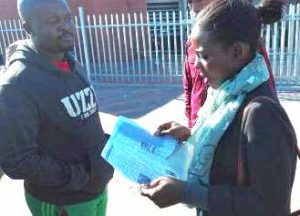SOUTH AFRICA, October 16—Recently we’ve seen many uprisings in Latin America. What can the party do to reach these workers? Without communist leadership it always reverts to some kind of reform that will ease the pain but will not alleviate the suffering. The party has to grow everywhere.
As the party celebrates 10 years of existence, we need to honestly analyze our advances and the obstacles that hold us back from realizing our potential level of recruitment. Our fundamental task is to recruit workers to fight for communism. Without recruiting workers and soldiers, there can be no revolution.
Worldwide we distribute thousands of Red Flags every issue. Why aren’t more workers joining us? We don’t ask them to join. People will not simply join.
For example, comrades here were excited when we came back from distributing 2000 Red Flags at a May Day event. But when asked “How many people agreed to join or agreed to come to our next meeting?” most of the comrades who had distributed the paper didn’t even ask anyone to join.
And when you ask the question, it provokes other questions, like “to join what?” and then you explain “to join what.” It’s a starting point.
When we had a conference call recently, comrades in Seattle reported that they distributed RF in a school for close to two years. Yet they haven’t recruited any students there. Why? It’s not because the comrades are not distributing hard enough. Are they engaging with the students to get to know them and struggle with them?
When we focus on the quantitative changes that lead to qualitative changes in recruitment, the results can be really encouraging.

Comrade M is an auto worker in our collective. He joined last year, but we’ve been friends with him for more than 3 years. First he didn’t see the need to join us. He was unemployed and didn’t have first hand experience with exploitation by the bosses and labor brokers. But once he started working he understood more deeply what we had been saying. As a result he was the one who asked us to join.
Another factor that led him to join was the unity of the collective. The way we live made him want to join us. If someone is struggling with food, or a place to stay, we try to help. People see this closeness and some want to become a part of it. A comrade remarked that comradeship is the highest form of friendship.
Social relationships are the life blood of communism. Without this our growth would not have been possible. We are focusing on building relations with people we want to recruit. Then they feel comfortable to tell us their disagreements. We can struggle with them openly. We should focus on this worldwide.
It doesn’t have to be people we already know. For example, we met Comrade P at the May Day dinner. We have built communist relations with her, having dinner, spending time. She opened up to us. Over time it became easy for her to interact with the collective. It seems that she’s been with us for years, but it’s only been for a few months.
Things are interconnected. We need to build communist relations within the collective and also with people we are trying to recruit. The participation of comrades worldwide helps. If someone in the US contributes money, it helps here. Without contributions for the dinner, we wouldn’t have met some of the comrades who are now active in the party.
Our collective here is about five years old now. We have made advances but objectively we can do much more.
We need to critically look at our internal factors because those are the ones that will drive our forward movement. We need to be honest and not exaggerate—so we can understand how we will advance as our party approaches ten years.

